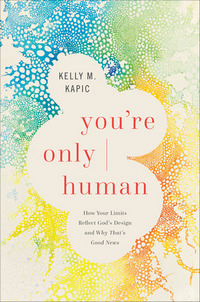 You’re Only Human:
You’re Only Human:
How Your Limits Reflect
God’s Design and Why
That’s Good News
DETAILS: Publisher: Brazos Press Publication Date: January 17, 2022 Format: Hardcover Length: 228 Read Date: January 23-30, 2022

What’s You’re Only Human About?
Creaturely finitude is less an idea we discover than a reality we run into.
When we do run into this idea (as we all will), we frequently interpret that reality incorrectly—not recognizing that our limits, our finitude, as part of who we are as creatures (or forgetting that if we do recognize that). As such we can push against them in unhealthy ways, ignore them to our own peril, or see them as the result of sin, not the result of creation.
What Kapic sets out to do is to remind us that part of being a creature is having limits. When we remember that, we can live as we ought—in dependence on the God who made us that way. As he puts it,
Many of us fail to understand that our limitations are a gift from God, and therefore good. This produces in us the burden of trying to be something we are not and cannot be.
Particularity and Limits
Kapic reminds his readers that the doctrine of Creation shouldn’t just be limited to our understanding of Genesis 1-2, but to reflecting on the design, abilities, and limitations of humanity. These limitations would be in place regardless of our fallen state—sure, the fall twists those limitations—but they’re part of the original state.
In the first part of the book, Kapic lays out the theology necessary for this—and ties it to the Gospel, lest we get distracted from what matters most.
Healthy Dependence
The second part of the book talks about the creaturely dependence that flows from this—we aren’t capable of everything we need or want to accomplish, but He is. This is part of created humanity, and it takes on new meaning in Christ.
Tied to this idea of dependence is humility.
Humility consists in a recognition of (and a rejoicing in) the good limitations that God has given us; it is not a regrettable necessity, nor simply a later addition responding to sinful disorders. Even if there had never been a fall into sin, humility would still have the essential character of gratitude for our dependence on God and for his faithful supply of our need. Humility is built on the Creator/creature distinction; its response to sin emphasizes our further need for God to restore us to the fellowship that he always intended us to inhabit.
Kapic spends a lot of time drawing out the implications of this—in light of both Creation and Redemption.
Lament and Gratitude
We can express our humility and dependence in both our lament and our gratitude—this part of the application section of the book was probably the most rewarding to me. Kapic makes the case that they’re mirror concepts rooted in humility and dependence on our Creator and Redeemer, and both ought to be embraced by the believer.
So, what did I think about You’re Only Human?
It took me over a month to be mostly satisfied with what I wanted to say about this book—an example of creaturely finitude, come to think of it. I struggled over this—really wanting to get into all of his ideas and arguments. But that’s not what this blog is for (thankfully, or I’d be working on this post for another six months, minimum). I’ve trimmed this post a few times while putting it together, in fact, because I kept getting in the weeds.
You’re Only Human is the kind of book that I really don’t think I got a handle on after one read—I’m planning on a re-read this summer, in fact. I’ve got a general sense of it, but I want to return to it having a bird’s-eye view, so I can appreciate more of the details.
I don’t know if this is going to hit every reader like it did me—very likely it won’t—but this is just what I needed. Still, I think what Kapic has to say will resonate with and be helpful for many.

This post contains an affiliate link. If you purchase from it, I will get a small commission at no additional cost to you. As always, opinions are my own.
![]()



Nicky Lock
One matter your review does not attend to (and maybe Kapic likewise) is how these concepts apply to those living with disability. Is this finitude or part of the fall – hence this quote ‘ Many of us fail to understand that our limitations are a gift from God, and therefore good. This produces in us the burden of trying to be something we are not and cannot be’ needs to be carefully used….
HCNewton
ohhhh, that’s a great point. Off the top of my head, I don’t remember if or how Kapic specifically addressed those living with disability (and I don’t have time to look through the book right now). Based on what I do remember, I believe I can say that in context that quotation is used with the pastoral care (and common decency) one would want to find.
I’m going to try to follow up on this within a few days, because you’ve got me thinking about it and I want to be sure.